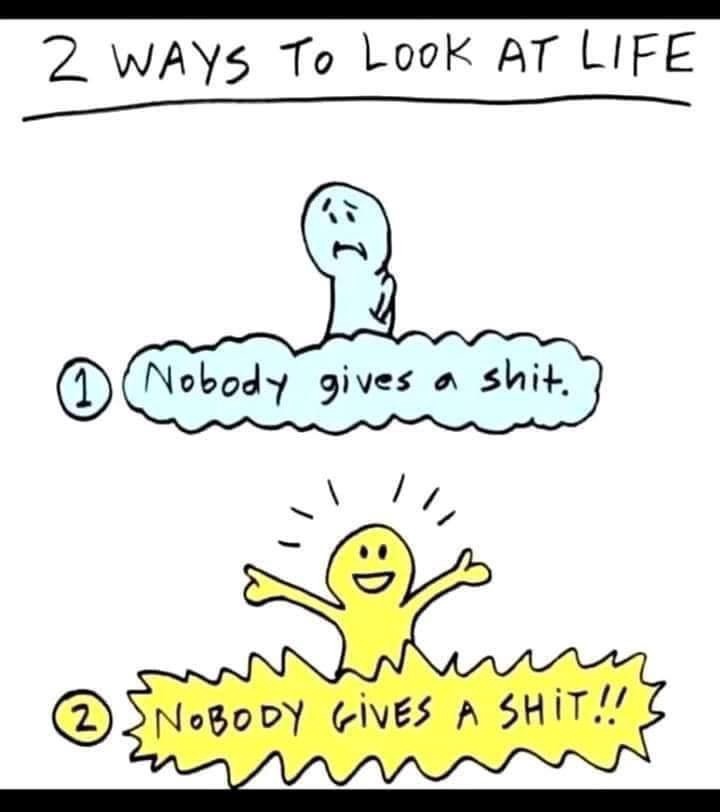Did someone say “greedflation”?

When I can go to a sit down restaurant and have a fresh cooked meal for less than going to mcdonalds, something is wrong. I will never eat there again. Pay more for less, and it’s absolute trash.
Isn’t that wild? My favorite mom and pop shops are at least 33% less expensive and made with solid ingredients (especially real ice cream milk shakes lol)
I wouldn’t recommend making this into a sticker and putting it on the door of these places so people can see. Don’t do that, it would be vandalism.
Almost as if in capitalism, a system where companies are free to choose their prices, inflation could be caused by companies choosing to rise their prices…
Leadership at these companies is personally compensated based on how quickly the company grows. They’re trying to maximize growth of the company by absorbing demand from the higher end, but in the process of doing so they end up pricing out the low end of the market, leaving low end consumers under served. They’re growing, they’re leadership is getting compensated better than ever, but now it’s difficult to find affordable places to eat out.
Theoretically what is supposed to happen in such a situation is new companies come in to take advantage of the gap left, but that’s not really happening because investment is all being focused on higher return opportunities. The low end stuff is still profitable and has potential for growth, but it’s not profitable/growing enough to attract investment over stuff that is perceived to be growing more aggressively.
Unregulated capitalism will be the death of us all.
Capitalism will be the death of us all.
Only once there’s no longer a profit in keeping us alive.
So we’ve got a couple good years left in us!
I’ll take it one step further: currency was a bad idea that turned resource allocation into a number-go-up game.

Disagree. Currency allowed the flourishing of civilization. You can’t effectively trade between cultures or at long distances on the barter system.
What we’ve done with currency since then, yeah, maybe we’re on the same side there. But currency, created as an abstract for value, was a great invention. Civilization as we know it would not have been possible without it.
Though, now that I mention that… maybe civilization “as we know it” isn’t so hot after all.
Don’t you love when you end up talking yourself out of your own argument?
Collusion
News reads more and more as advertisement. “Walgreens just lowered prices!” is what I’d expect to see between news stories not in them.
Greedflation. Call it what it is.
Corporate Greed will lead to humanity’s end.
deleted by creator
I mean isn‘t what‘s described here also just basic supply/demand?
Unfortunately, the demand for things like food doesn’t go down just because you don’t have money
Exactly! In economics there’s a concept called price elasticity (Incorporating two related principles, elasticity of supply and elasticity of demand).
Elasticity of demand is the more relevant one here. Products with elastic demand are those that consumers are quicker to change their buying habits around. For instance, luxury items. Products with inelastic demand are generally actual necessities (like groceries), where you’re gonna have to buy them one way or another. You can look to alternate suppliers with better prices, but when they’re all gouging you have no choice but to buy from one of them.
In the long run this can indirectly be forced to change. If it gets bad enough that people en-mass started growing their own food at home, this could cause the suppliers to reconsider their prices. (I know that’s a far-fetched example. I’m just using it to broadly illustrate my point.)
Sure, at the basic level, everyone needs food. But you can get a lot more granular about it. For example, a lot of people buy things they may not need to survive, like snacks/desserts. Or perhaps they do buy items they need, but they usually get versions that cost more (whether that be because the particular store is more expensive overall, or simply because they’re buying items that are more costly than things at the lowest end that still allow you to survive like beans and rice).
The point is, most (not ALL) people can buckle down their food spending in some way or another, and I think that’s what we’re seeing here.
What’s your argument here? That we should sacrifice in the name of corporate profits?
I personally am not interested in giving up the few luxury food items I buy so that the CEO of Kroger can buy another fucking yacht.
edit: I meant to say I’m not interested in paying more for less so they can keep buying yachts, but did a terrible job of that and ended up saying the opposite.
Have you tried eating dog food to help the shareholders yet?
Kibble only. If they catch you with some of that fancy wet dog food you’re going to get a lengthy lecture about financial responsibility.
Yeah, but I balance it out by feeding my dog avocado toast.
This reminds me. I’m out of fresh fish for the dog.
I’m not saying that, I’m going back and saying it IS a sort of supply and demand effect we’re seeing. People aren’t spending in ways the corporations wanted, so now they’re finally lowering some prices. That’s all.
It sounds like you’re blaming the consumer. As if we could avoid the current cost of living crisis if we just buckled down our spending.
I’m not blaming anyone but the corporations here. My post was simply an observation of what’s happened, but for some reason people are taking it wrong I think.
Yeah… People just need to start slurping down gruel for every meal and be happy about it. How dare someone complain about grocery store prices when I know for a fact they splurged on a bag of name brand potato chips last week! The poors are not just entitled but completely irresponsible. Don’t they realize simple luxuries like snacks are for rich people?
That’s what a lot of people here and on reddit tell you when you say it’s expensive to cook. Rice and beans, rice and beans, eat your rice and beans every day.
Thanks, I enjoy some occasional rice and beans, but I prefer having a will to live over eating beans every day.
You are not brasilian
I think you misinterpreted what I wrote? I’m not saying people SHOULD reduce their food spending, i’m saying they’ve been kind of forced to, and so in effect that’s why prices are going down. So it IS a supply and demand effect of some kind.
That’s not at all what they said
I was going to say the same. Of course there is always a base demand, but there is a reason why 300 years ago fat people were considered wealthy simply because they could buy whatever they wanted for food.
But this discussion is all besides the point. The post says „as soon as we stop buying shit prices go down“, and that is a simple principle of supply demand. I also never stated that this was the sole reason for massively inflated prices, because it‘s not. Again, i was just referring to a thing that was said in the post itself.
The community on here isn‘t really better than on reddit, it‘s all an echochamber as well, which i‘m fine with.
It is. It’s partly walking back price gouging (which happened because there was no government there to stop them) and partly a correction for the loss in buying power overly greedy price gouging during high inflation has caused.
No, it’s greed. They aren’t hurting for supply, so there’s no other reason to raise costs other than greed.
But the post says „they stopped buying and price goes down“ reduced demand makes price go down. I‘m not defending corpos or claiming that they‘re not greedy. I‘m just discussing what is stated in this post because it‘s a bad example of greed.
“Supply and demand” refers to the two-way street of scarcity wherein the less “supply” there is, and the more “demand” for the product, the higher the price will be. The point is, if you want to attribute it to “supply and demand”, you need both ends - the scarcity of supply, and a rise in demand. If you have one or the other, but not both, and prices increase, it’s due to other causes.
Attributing price changes to “supply and demand” doesn’t mean it’s being attributed to both (ie supply changes and demand changes), simply that there is now a mismatch between the two
In this case, if supply remains the same, but demand decreases, then the price will go down until they are in equilibrium again
In a terrarium economy. We’re so divorced from actual value this econ 101 stuff barely applies to late stage capitalism.
Yeah, lowering prices by itself isn’t evidence that it was just greed all along, they conceivably could be lowering prices to the point that sales on those items are no longer profitable in order to shed inventory because some money (at a loss) is better than no money (at an even bigger loss)
It absolutely is. Which is why the prices of necessities such as food, electricity, water, housing, basic clothing, healthcare and education shouldn’t be up to supply and demand to decide.
Pretty sure laws exist that are supposed to prevent price gouging, but they require a government that actually enforces said laws…
Businesses reduced prices when people started buying less of their product? HOW COULD IT BE.
Everyone wants a ton of cheap shit and they feel like price is owed to them. You want prices to be lower for shit? Stop buying shit. I assure you, that will really freak them out.
You want to see CEOs lose their jobs? Stop buying shit. You want to see the managerial class shrink? Stop buying shit.
The fact remains, no one is going to stop buying stupid shit. The entire global culture, to varying degrees but with few exceptions, is tilted towards consumerism.
Everyone keep doing what you’re doing. Everything is fine. No cause for panic. You don’t need savings. You don’t need property of any sort. Want a song? I’ll rent it to you. Want to live somewhere? I’ll rent it to you. Movie? I’ll rent it to you. Education? I’ll loan it to you.
There are people with property, and those allowed to use it for a fee. Welcome to neo-feudalism.
Canadians will force our grocers to do the same by crushing loblaws.
Obligatory fuck Loblaw’s.
I don’t think there should be price caps, but, I think we could get somewhere having a maximum amount you’re allowed to raise your prices by in a single year and how long you have to take to get there.
I think this rate should be tied to federal interest rates to create a competing class interest to the owner class wanting interest rates to stay low forever even if it breaks the bank for everyone else.
I mean, just break up the massive corporations. Capitalism requires seller competition in the marketplace in order to provide an incentive to drive down prices. If there are too few players, they can easily make unspoken agreements to fuck over consumers.
The problem is we have historical evidence to show that that doesn’t exactly work. Standard Oil’s broken up parts have mostly been able to informally collude with one another on “turf” and in some cases even defy having been broken up to reacquire each other.
The oil companies reconglomerated, in part, because we stopped enforcing anti-trust nearly as much as originally intended when we started using the stupid-ass Chicago school of thought from the 1970s onwards. It’s only in the last ten years or so that’s it’s become legally reasonable to say “hey actually the Chicago school of though kinda sucks.” Standard Oil in particular is a bad anti-trust example because Rockefeller was such a personality cult that everyone around him was completely wrapped around his finger. In any case, you can still punish companies for price fixing if you’ve force them to be legally separate, which you can’t do if it’s all one legal organization.
The telecom industry is another example where anti-trust break-ups didn’t lead to more competition, for somewhat similar reasons. They were broken up by geographic regions and each region made gentlemen’s agreements not to expand into each other’s territory. When we stopped enforcing anti-trust as much, they bought each other out.
In general, however, breaking up monopolies is effective, so long as doing so actually creates competition in the marketplace. This is most effective in markets with low barriers to entry or ones where there’s already a large number of smaller companies that are simply too small for meaningful competition with mega-corp. It’s least effective in markets with extremely high barriers to entry or ones where it’s easy to collude and get away with it. In any case, it’s still worth it to break up monopolistic companies because it still reduces their power, even if it does so more effectively in some markets than others. Among other benefits, it makes it easier for new competitors to establish themselves in the market, since their competitors have a harder time utilizing unfair practices the smaller they are.
Marxists: inflation isn’t caused by increase in wages that drive up demand, its caused by companies conspiring to increase prices. This was proven 125 years ago in Value, Price and Profit…
Non-Marxists: god can’t you ideologues just stop repeating the same outdated theories? There’s no conspiracy, class isn’t real
Inflation: happens
Workers: I think there’s a conspiracy to raise the prices of things because wages went up
Corporate and government overlords: no, you see increase of wages creates increase in demand of goods which increases prices, I went to Yale
Workers: i just got a raise and yet I can’t afford to eat anymore
deleted by creator
As a communist who hates Trump for being a rapist, racist pos, the recent inflationary period didn’t happen during his mandate.
deleted by creator
So the market works. What’s the issue then
In the market, this is referred to as “price elasticity”. The basic concept of it is: if you charge less, you sell more, and can increase profits. There’s obviously limits to this (which are largely unknown) if you charge so little that everyone who would buy your product is buying your product, then reducing costs any more than that, will result in less profit. So there is a “sweet spot” of pricing that returns the most money.
I learned about this more than a decade ago and what I was taught at the time was that there were very few items that are generally considered to be very inelastic for pricing: petrol (gasoline), booze, and tobacco. Gas, because everyone needs to drive, booze because drunks are going to drink, and tobacco because nicotine addiction. Even then, there’s still some elasticity in the pricing, more so as time marched on; stuff like hybrid cars, work from home, etc, for gas, booze, with the availability of (kind of crap) liquors that are priced accordingly, and the force of the anti-smoking campaigns/concepts/etc.
Other things were always considered far more price elastic, like food. During and after the pandemic, options for purchasing food were limited, so they fell into a more price inelastic status, since demand didn’t change, but supply became more limited. I’m sure more than a few things like farmers markets, became inaccessible. The people who would be using such inexpensive options were suddenly forced into buying from grocery stores and price fixing and gouging was more possible; not dissimilar to how gas prices work. Each location would raise prices to match whatever their “competitors” were doing.
Now that people have started to find alternatives, either by growing a portion of their groceries, or finding less expensive alternatives or simply buying less, companies are trying to find where the “sweet spot” is for maximum profits.
This isn’t a new thing, nor is it unique at all. It’s the reason that booze, gas, and tobacco have some of the highest tax costs of any products. If companies/government/producers believe they can charge more to earn more profit overall, they will. What’s happened is that they dug so deep in raising prices that profits took a dip. They’re selling each unit for more profit, but so many fewer units that they make less overall.
It is the way of capitalists to find the highest price that people will pay and still buy a thing.
They have clearly gone too far, and it has cost them their precious profits.












